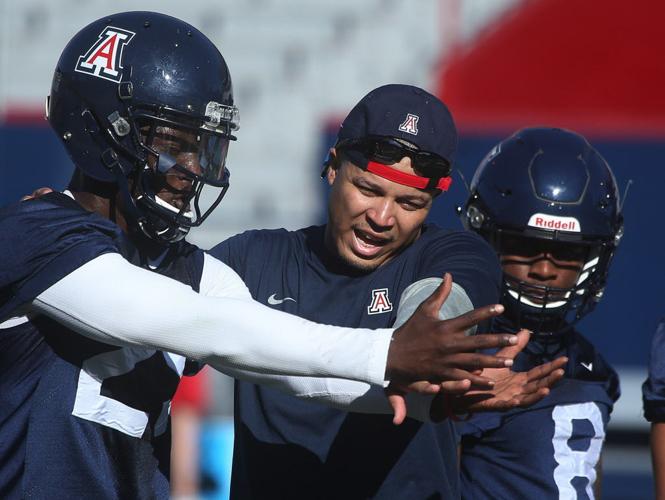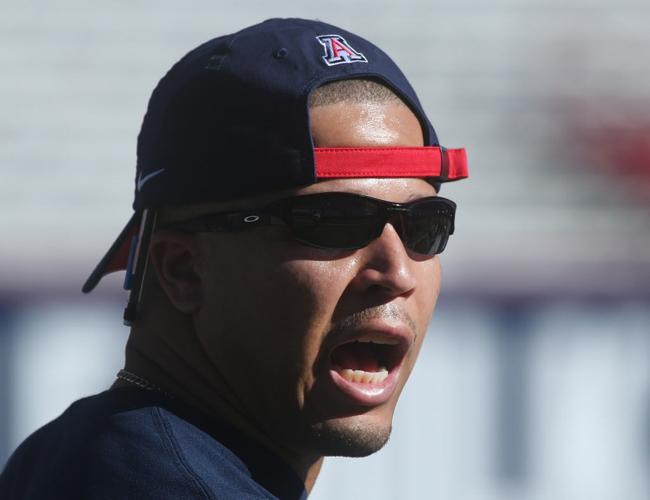Before Donté Williams had time to learn about the Old Pueblo, its exquisite Mexican cuisine or even take in a basketball game at McKale Center, he hit the road.
Williams was hired to be a part of Rich Rodriguez’s revamped — read: younger — coaching staff on Jan. 17. Within 24 hours he was in Southern California trying to persuade high school seniors to play for Arizona.
“It’s been hectic,” Williams said.
Williams spent nearly all his time leading up to Feb. 3 signing day traveling. He’d recruit in California, then come back to Tucson on the weekends to host official visits.
For Williams, renowned for his West Coast recruiting talents, the adjustment period wasn’t so bad.
“I think it wasn’t hard to get adapted,” Williams said. “Was I on the airplane, on the Internet, constantly looking stuff up to know what exactly what we’re selling and what we have to offer? Yes.
“But at the same time that’s a part of your job; you do your homework.”
Williams, 33, came to the UA from San Jose State. The move capped a quick rise through the coaching ranks: He started as an junior-college assistant before taking graduate assistant positions at Washington and Nevada. The former Syracuse and Idaho State safety will coach cornerbacks on a UA staff that includes, among others, new defensive coordinator Marcel Yates.
The Star talked to Williams about his approach to recruiting:
Have you a difference now that you’re approaching recruits coming from Arizona and a Pac-12 school as opposed to San Jose State?
A: “So far, I haven’t gotten a chance to notice as much. I guess I will say because we haven’t had much of a chance to go in schools. When we started back recruiting it was more specific players. It was more a home visit, going to get that particular guy that’ll help us win right now, to fit a need, an ‘OKG’ guy, right now. It’s going to be a lot different when spring comes around and I think that’s when you start noticing the difference.”
“Granted, now in my talking to guys at first who I think liked me as a coach, now all of a sudden they’re interested in joining us. That has changed. I will say that. The top-level recruits, I feel like now I’m not only just talking to them but now I have a complete shot.”
The recruiting landscape has changed so much with players not really sticking to verbal commitments like they used to and with all the resources teams have recruiting now. How has that affected your approach, if at all?
A: “I think it’s changed a lot. If you do everything by yourself, it’s hard. I think if you do it by yourself, you’re going against other places that has a whole team, has an army. I think here, the environment that we’re pretty much having, is that this is a team. So I definitely think we’re going to have a legitimate shot at whoever it may be. We’re attacking it all together as opposed to just one guy doing everything by himself.”
The top-level recruits get coaches in their homes, and a lot of them say the same things. How do you cut through all of that to stand out?
A: “You want players saying, ‘Everything he’s telling you has came true for me.’ Then all of a sudden it’s easier for guys to buy into that environment because they know what you’re saying is the truth. You’re not just going in and talking for no reason. Everything you’re saying is honesty.”
How much does a younger coaching staff help, being able to connect with these 16- and 17-year-old kids?
A: “I don’t think age really has anything to do with it when it comes to connecting with the players. I think you can be 70 years old and act 90, or you can be 70 years old and act 30 — just like you can be 30 years old and act 70. So I think it’s more how you are as a person. It’s not really about age because pretty much all of us one day are going to get a little bit older. All of us at one point were younger. I don’t think it’s really age; I think it’s how you are as a person, and just adapting to the atmosphere and environment in which you’re in.”
Do you remember your recruitment coming out of high school?
A: “My recruitment was all over the place, but my mom told me where I was going and that’s where I went, so it made it easy.”
Did you draw from that experience at all when you first started getting into recruiting?
A: “A little bit. ... To me my mom is everything, so it’s easy for people to understand ‘who did I trust?’ Nowadays there’s so many people talking up on a kid. You watch his highlight tape because one guy told you about it and well, the high school coach, the guy he works out with, his best friend, his cousin, everybody sent you the same guy. So it becomes: who exactly does that kid trust? Who does that kid like? Different things like that.
“Now you have to hit it from every angle. (At) first when I was getting recruited, you just had to know my mom. Now to recruit a particular kid you have know 25, 30 people. So it’s changed in that regard.”
You came in here with a reputation for recruiting Southern California. How did you build that up?
A: “For one, I’m from Southern California, so that helps a lot. In Southern California even with me growing up, I would always come back and every time I come home, I never really worked out with the same guy every time. I would work out with somebody for a week, then somebody else for a week, then somebody else for a week, so a lot of people at that time that helped me when I was younger are still doing it now.
“So it’s easy for them to get to know me, and me to get to know them. It’s not a two-week or year relationship, this is a relationship that’s been 15-20 years, per se, so we know each other pretty darn well. What’s grown for me, and helped me in the last few years, is my relationship that has started in Northern California and Central California. The Southern California thing is easy for me.”
Have you built relationships to the point that if a certain guy says, ‘You need to look at this kid,’ then you know you need to take a look?
A: “I have, and at the same time, you never leave a stone unturned. So if anybody sends me a text, or if you have my phone number, I know you. So, if anybody sends me somebody right now, I’m looking. You never want to close your ears or close your eyes to one or two people. You’re pretty much looking over everybody and anybody you can. Are there people I might trust more? Yeah. But at the same time, you never know what may happen.”
How often did you cross paths with Marcel Yates on the recruiting trail?
A: “A lot. He was a thorn in my side, actually (laughing). It was him and it was one other guy, I’m not gonna say his name and give him credit, but it was from a school down South. Those were the two guys who were always a thorn in my side. Especially with Yates because he’s from L.A. also, so that made it a little tough. I couldn’t just use the L.A. pitch any more. That was an issue, so it’s great to have us on the same side now.”





